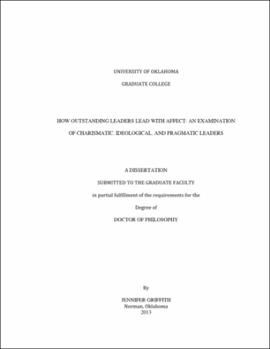| dc.description.abstract | The CIP Model of Leadership has received increased attention within the past decade. Research in this area has examined how leaders develop mental models, frame messages, communicate goals, and utilize political tactics to form relationships with followers and impact society in a meaningful way. However, discussion of how CIP leader types use emotions and influence tactics to influence followers and affect society is notably absent in the literature. To fill this gap, the current effort focuses on how charismatic, ideological, and pragmatic leaders differ in their use of emotional displays and influence tactics while maintaining similar levels of communication effectiveness, follower satisfaction, and leadership effectiveness. Results suggest that the emotional displays and influence tactics that leader use successfully discriminate between CIP leader types and create distinct leader styles. Implications of these findings are also discussed. | |
